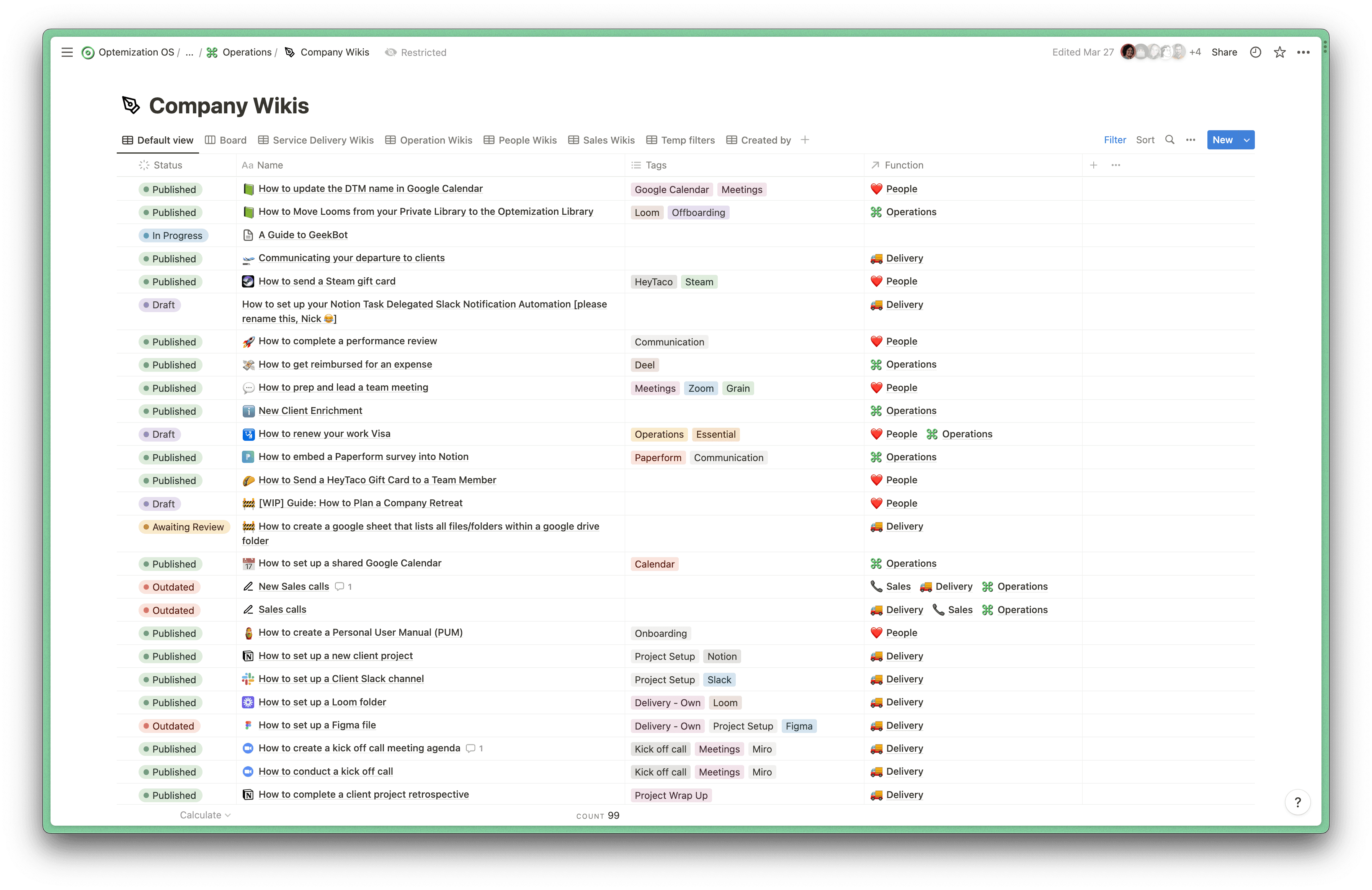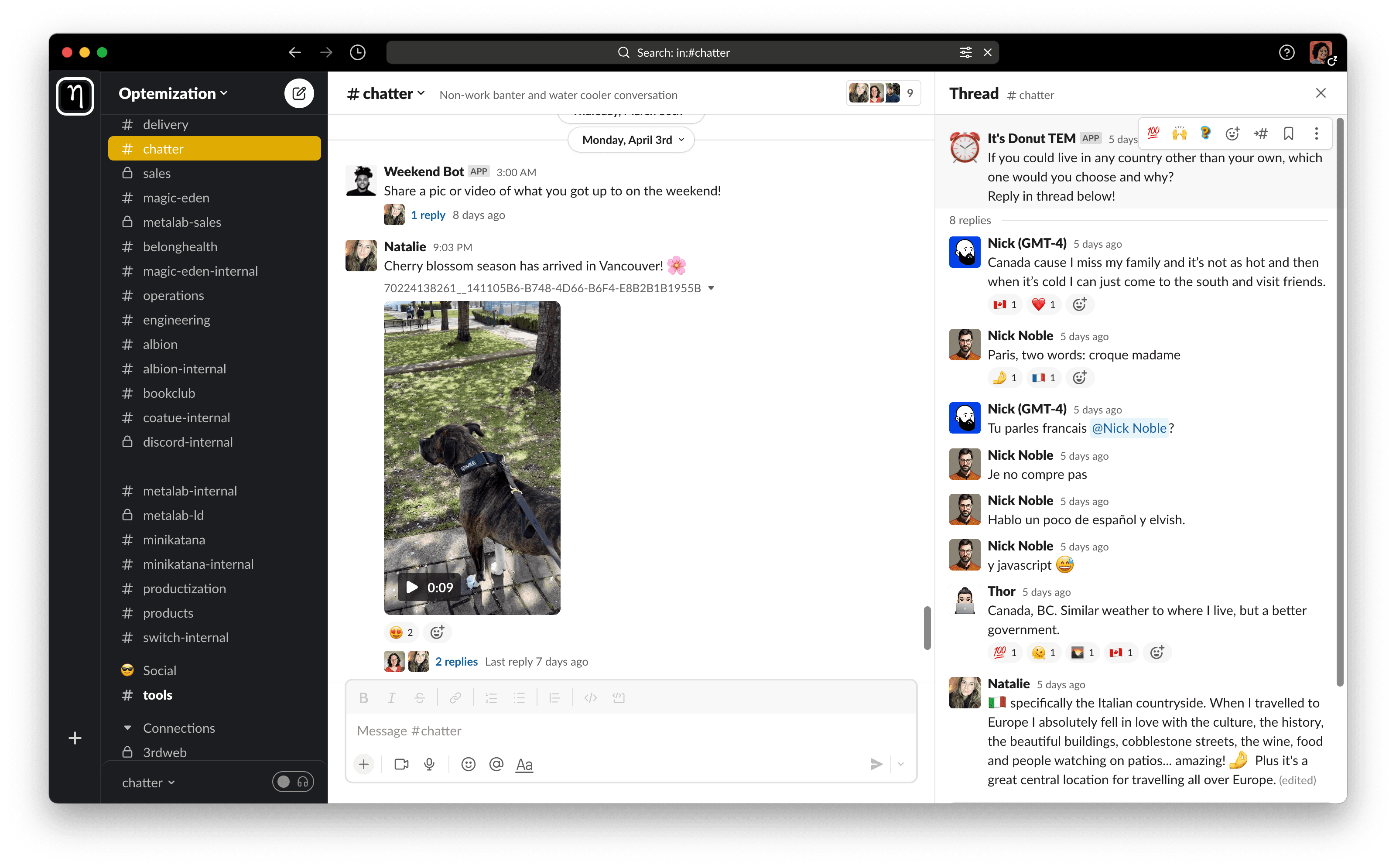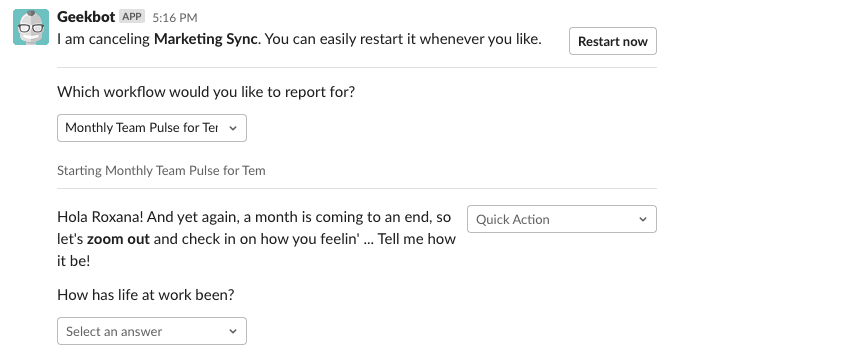Effective team management is essential for the success of any team, but it becomes even more critical when managing a remote team. With team members working from different locations, time zones, and even countries, it can create a unique set of challenges for any organization.
At Optemization, we understand first-hand the importance of effective team management practices to ensure our distributed team is communicating and collaborating efficiently and performing at their best.
In this post, we’ll share our top team management best practices to help maximize your team’s productivity and performance. From choosing the right tools, to communication strategies, and tips for setting clear expectations, we'll walk you through the essential elements of effective remote team management.
Effective team management starts with great leadership — a skilled manager can ignite a team’s full potential
It's not enough to have a talented team - it takes a skilled manager to recognize each team member's unique strengths and align them with the overall objective of achieving the organization's goals. By providing regular feedback, recognizing and celebrating successes, and providing opportunities for professional growth, great managers can motivate and inspire their teams to do their best work.
A great manager should also possess exceptional communication skills, empathy, and the ability to cultivate a positive and inclusive work environment. These qualities promote a culture of trust, teamwork, and accountability, which ultimately leads to increased productivity, employee satisfaction, and retention rates.
It’s important to note that being a good manager is not just about managing tasks and deadlines but also about nurturing relationships and developing individuals. A manager who invests in their team by providing opportunities for growth and development encourages creativity and ownership in one’s work, can help foster loyalty and a sense of belonging within the organization that can unlock the full potential of a team, and ultimately contribute to the long-term success of the company.
Establishing trust is a crucial aspect of effectively managing a remote team. Managers must trust their team members to work independently and deliver high-quality work. At Optemization, we recognize the significance of trust and consider it one of our core values. We firmly believe in the intrinsic goodness of others, doing what is right, and taking responsibility for our actions. This belief fosters a culture where we take ownership of our work and trust each other to fulfill our responsibilities.
Provide the right building blocks for success
When working remotely, teams need to have access to a solid foundation of building blocks that allows them to communicate and collaborate effectively and be as productive as possible. Without the right tools and strategies, remote teams can face several challenges, including communication and collaboration barriers, struggles with productivity, difficulties managing projects, and feeling siloed.
Document everything — and make sure it’s up-to-date and can be easily found
When your team works remotely, they don't have the luxury of popping over to a coworker's desk to ask for help. That's why it's essential to have everything they need to know well-documented so they can get their job done without any delays.
Knowledge management is crucial when it comes to team management and performance because it helps teams capture, organize, and share knowledge and information, which can improve decision-making, increase productivity, and enhance the team's overall performance.
Our team’s tool of choice when it comes to knowledge management is Notion. Using Notion helps to ensure that our team members have access to the information they need to make informed decisions, which can lead to better outcomes. When knowledge is well-organized and easily retrievable, team members can be more productive and efficient, saving valuable time.

Not only does everything in your organization need to be documented, but it also needs to be kept up-to-date and easily retrievable. Documentation is useless if no one on your team can find what they’re looking for.
At Optemization, we have documented almost every aspect of our company — including all of our tools (and information about them) and processes, and have created various standard operating procedures, wikis, and guides. Everything that anyone would need to know about the company or how to do their job can be found within our knowledge management.
Documenting everything in your company is important for knowledge management, consistency, compliance, improved efficiency, knowledge transfer, and onboarding. By maintaining clear and detailed documentation, you can help your company operate more effectively, comply with legal and regulatory requirements, and ensure that your employees have the information they need to be successful.
Organizing and tracking projects and tasks
Another essential building block to effective team management is having an intuitive project management system. It can help you stay organized, prioritize tasks, facilitate collaboration, hold team members accountable, and provide valuable data and insights into your team's performance. Investing in a good project management system can help your team work more efficiently and effectively and achieve your goals more successfully.
At Optemization, we also use Notion for our project management. Having a centralized hub for our project and knowledge management has helped us streamline our systems. Our team can log into Notion each workday and access their tasks, view projects and meeting agendas, and find documents, which saves us valuable time not having to switch back and forth between apps.
Communication and collaboration
Communication and collaboration are crucial components of effective team management because they help ensure that team members are working together towards a common goal, understand each other's perspectives, and can solve problems together more efficiently. It also helps to reduce redundancy, minimize errors, and help the team achieve its objectives more quickly.
When everyone on the team is aware of their responsibilities and is held accountable for their work, it helps prevent misunderstandings and keeps the team on track toward its goals; this can lead to higher morale, greater job satisfaction, and better performance overall.
At Optemization, we use Slack for our internal communication. We set up various channels within our Slack workspace for each department to keep conversations relevant and on topic. We also created informal channels for non-work life chats (such as #chatter, #film-tv, #health-wellness, and #bookclub).

Set clear expectations
Providing the right tools is only part of the equation when it comes to supporting a remote team. It's essential to align your team on which type of communication to use, when, and where. Setting clear communication expectations, or "Rules of Engagement" (ROE), can help save your team valuable time and frustration. Establishing clear communication expectations is essential for effective team management for several reasons:
Avoid Misunderstandings: When communication expectations are unclear, misunderstandings can occur, leading to confusion and mistakes. By setting clear communication expectations, team members know what is expected of them and what information they need to communicate to their colleagues, reducing the risk of misunderstandings.
Enhance Collaboration: Clear communication expectations help team members understand how to collaborate effectively. It helps them know when and how to communicate with each other, allowing them to work together efficiently and effectively.
Increase Productivity: Clear communication expectations can help increase productivity by reducing time wasted on unnecessary communication. With clear expectations in place, team members can focus on what is important and communicate efficiently without overburdening others with unnecessary messages.
Build Trust: Clear communication expectations build trust among team members. When everyone knows what to expect from each other, they can build trust and confidence in each other's abilities and intentions.
Encourage Accountability: When team members know and understand the importance of what is expected of them, this helps them take responsibility for their actions.
When creating or refining your team's communication guide, make sure to include the following:
Which tool to use for the type of communication - a team member should know where and how they should communicate an OOO, announcement, a question regarding a project or task, or where to ask for feedback.
What type of communication and tools are used for synchronous vs. asynchronous communication (and the expectations surrounding each of those tools)
How to effectively delegate tasks - we have a “Delegated Task” template built in Notion that allows our team members to quickly and easily delegate tasks to one another.
Foster a positive team culture
A strong team culture is the foundation of a successful team. As a leader, you can foster a strong team culture by encouraging team members to share ideas, recognize and celebrate successes, and provide constructive feedback. A positive and supportive work environment encourages collaboration, innovation, and creativity.
Remote teams need to have a strong culture to build a sense of community and identity. Effective team management ensures that team members understand the company culture, values, and goals and are aligned with them. They often require a higher level of autonomy and self-direction than traditional teams. Managers should empower team members to make decisions, take ownership of their work, and provide the resources and support they need to succeed.
Feedback and Recognition
Feedback and recognition are crucial elements of effective team management because they can significantly impact the team's morale, productivity, and overall success.
Feedback provides team members with a clear understanding of their strengths and areas for improvement, helping them to identify what they are doing well and what they need to work on. Regular feedback also enables team members to continuously develop their skills, leading to a more engaged and motivated workforce.
When it comes to feedback, we’ve created a two-way street. We utilize a Slack app called Geekbot which enables our team members to share weekly and monthly feedback, allowing our CEO to keep a close pulse on the team's morale. In addition, Geekbot feedback is complemented by our bi-weekly and monthly 1:1 check-ins, providing a comprehensive feedback mechanism for the team, moving away from the traditional annual feedback and performance reviews.

Recognition, on the other hand, is important because it acknowledges and celebrates the contributions and achievements of individual team members. Feeling appreciated and valued for their hard work can boost team members' confidence and motivation, leading to higher levels of job satisfaction and a greater sense of loyalty towards the team and the organization.
When it comes to showing recognition, our team uses the Slack app called Hey Taco as part of our peer recognition program, which is a great way for us to bolster our remote team's motivation and engagement, which also aligns with our culture of gratitude. Since our company has a flat hierarchy, using the Hey Taco app allows managers and all team members to recognize and reward their peers for a job well done. The virtual tacos that are earned can be redeemed for online gift cards of the team member's choosing.

Conclusion
Managing a remote team can be both challenging and rewarding. By implementing the best practices of effective communication, collaboration, trust, and culture, managers can lead remote teams to success. It's important to remember that managing a remote team requires a different approach than managing an in-person team. As a manager, it's essential to be proactive, adapt to unique challenges, and establish a positive work environment. By doing so, you can ensure that your remote team is productive, engaged, and successful. With the right tools and mindset, managing a remote team can be a fulfilling and successful experience.


